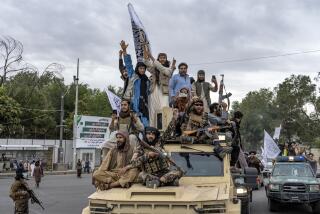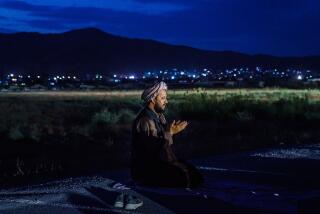Karzai asks end to NATO’s civil reconstruction
In the latest salvo aimed at his Western backers, Afghan President Hamid Karzai declared Tuesday that reconstruction and development units supported by the NATO force should be phased out.
The president’s assertion appeared to catch NATO’s International Security Assistance Force by surprise. A military spokesman said no timetable had been set for the shutdown of provincial reconstruction teams, known in military parlance as PRTs.
The teams, based at Western military installations, operate in 27 of Afghanistan’s 34 provinces, providing services such as community healthcare and educational support. Although the North Atlantic Treaty Organization considers the units an essential means of reaching out to impoverished Afghans and helping turn them away from the Taliban, Karzai has long denounced them as one of a number of Western-created “parallel structures” that undermine the authority of his government.
The Afghan president recently has sought to sharply curtail the operations of private security firms. He has also voiced objections to Western-funded aid projects that bypass government ministries and funnel money directly to contractors and subcontractors.
Over the last year and a half, Karzai has taken frequent rhetorical swipes at Western governments whose troops are waging the Afghan war and whose aid props up his administration. It has become a rarity for him to make a public appearance or policy statement without invoking the theme of foreign meddling, which he did again Tuesday.
“Afghanistan belongs to Afghans,” he said at a news conference in Kabul, the capital. “Afghans don’t want government from abroad. Afghans don’t want a European government. Afghans don’t want an American government. Afghans don’t want a Pakistan government. Afghans don’t want an Iranian government.”
Karzai is not the only critic of the reconstruction and development units, however. Some international aid groups have long expressed reservations about the militarization of development assistance, saying it endangers all those associated with humanitarian efforts.
U.S. officials have also acknowledged that the process of vetting projects and tracking the disbursement of development money is deeply flawed.
Still, Karzai’s broadside could foreshadow increasing pressure from him for the Western force to adhere to a timetable laid out by President Obama more than a year ago, calling for the pullback of American forces to begin in July of this year. Senior U.S. commanders and policymakers have since backed away from that time frame, saying the scope and timing of the drawdown of more than 100,000 American troops will be based on battlefield progress.
The Afghan leader has said he would unveil a plan next month for the start of the transfer of security responsibilities to the Afghan police and army.
NATO and the Obama administration have endorsed the notion of handing over most security responsibilities to Afghan forces by 2014, but Western officials acknowledge that it will take a concerted effort to bring the Afghan army, and particularly the police, to a reasonable standard of competence in the next three years.
The winter traditionally brings a lull in military operations in Afghanistan, but Western and Afghan officials say they expect confrontations with the insurgents to begin intensifying next month, when Taliban fighters start filtering back from havens in Pakistan.
The NATO force Tuesday reported the deaths of two of its members in separate explosions in the south. It did not disclose the troops’ nationalities.
More to Read
Sign up for Essential California
The most important California stories and recommendations in your inbox every morning.
You may occasionally receive promotional content from the Los Angeles Times.










